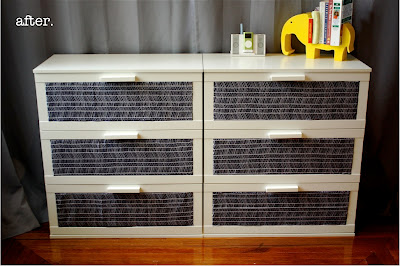Materials: Fabric, 2 Aneboda Dressers
Description:1. Using the cardboard packaging from the dressers, I measured out 6 rectangular panels, marking where to cut each panel with masking tape.
2. With an
X-acto knife
, I sandwiched the cardboard between two cutting boards. The bottom cutting board would protect our beautiful hardwood floors from getting scratched, and the top cutting board served as a second guide (in addition to the tape) for where I needed to cut each panel. I stuck each panel in front of the translucent dresser front to make sure it would fit. The translucent parts of the drawers aren't flush with the frame holding them, so a cardboard insert would make each drawer front flush with its frame as I cut the panels exactly right. Luckily, I had, which was nothing short of a miracle. My belly made it hard to find a comfortable working position, so I spent a good half-hour of my time rolling around on the floor, splayed in various not-so-ladylike positions, trying to get the X-acto blade in exactly the right place for cutting the panels.

3. Using two yards of fabric I purchased online, I cut out six pieces of fabric just slightly (less than 1/2 an inch) larger than each of my panels and used hot glue to secure each fabric piece to the cardboard. To make sure that the fabric stayed in place, I used packing tape over each glued side.
4. With some heavy-duty double-sided tape (think carpet tape), I secured each panel to a dresser front.
The whole project cost me less than $20 and only took an afternoon, even with my 30-minute belly adjustment period.
See more of the
Aneboda dresser.
~ Ann K., Kuala Lumpur, Malaysia





Post A Comment:
0 comments:
Post a Comment